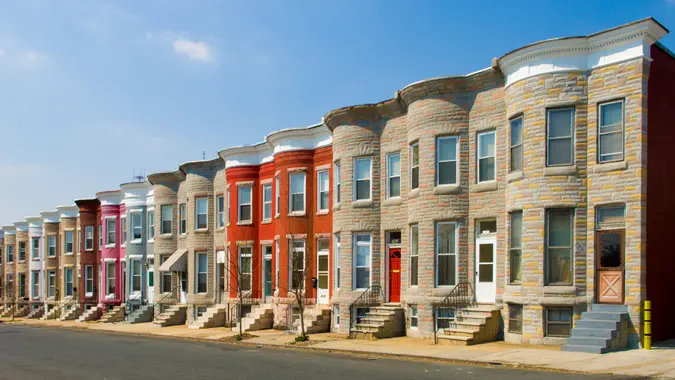What Is a Piggyback Loan? What To Know If You’re Looking For a Mortgage

Commitment to Our Readers
GOBankingRates' editorial team is committed to bringing you unbiased reviews and information. We use data-driven methodologies to evaluate financial products and services - our reviews and ratings are not influenced by advertisers. You can read more about our editorial guidelines and our products and services review methodology.

20 Years
Helping You Live Richer

Reviewed
by Experts

Trusted by
Millions of Readers
If you’re considering buying a home and you already own one, a piggyback loan may be a viable option. However, taking on a second mortgage isn’t for everyone.
Here’s what you need to know if you want to use a piggyback loan to buy your next home.
Piggyback Loan Definition
A piggyback loan is a term used by mortgage lenders when a borrower takes out a second loan in addition to their original mortgage to purchase a home. The first mortgage covers 80% of the purchase price, while the second loan typically includes a home equity loan or home equity line of credit (HELOC) to cover part of the down payment. Any outstanding down payment balance after the piggyback loan is paid in cash by the borrower.
Applying for a piggyback loan typically follows the same process as applying for a traditional mortgage.
Pros and Cons of Piggyback Loans
When considering a piggyback loan, it’s important to examine the advantages and disadvantages.
Pros
There are a few key advantages to a piggyback loan.
Avoid PMI
When you take out a conventional loan with a down payment of less than 20% of the purchase price, you are required to buy Private Mortgage Insurance (PMI) to protect you if you default or fall behind on payments. One of the most attractive benefits of a piggyback loan is the chance to avoid paying PMI.
Lower down payments
A piggyback loan allows you to pay as little as 5% or 10% in cash for a down payment. If a costly down payment prevents you from purchasing a home, a piggyback loan can give you a better chance.
Deduct interest from both loans
The interest you pay on a qualified mortgage debt or home equity loan is deductible on your federal tax return if you itemize your deductions per IRS guidelines. However, it may be difficult to calculate how much you would save, so you may want to speak with a tax professional to decide if it would make sense to claim the mortgage interest deduction.
Cons
Make sure you consider these disadvantages before securing a piggyback loan.
Higher interest rates
Since a piggyback loan is considered a second mortgage, it usually has a higher interest rate. These loans also typically have a variable interest rate, meaning your interest rate can fluctuate and rise. Depending on how high interest rates get and how much your payment increases, you may wind up spending more than you saved by avoiding PMI.
Double the closing costs
Two loans mean you will have to pay two closing costs. In some situations, your additional closing costs may add up and break even on potential savings you acquired from avoiding PMI. It’s important to do the math or if possible, find a lender that offers home equity products with low or no closing costs.
Difficult to refinance
In most scenarios, your piggyback loan and your original mortgage are through two different lenders. You may have a difficult time refinancing your primary mortgage if the piggyback loan lender doesn’t agree with the refinance.
Bottom Line
A piggyback loan can be a helpful tool if you’re struggling to pull together the funds for a downpayment on a home. Depending on home prices, this may be an appealing option. However, it’s important to understand the ins and outs before taking out a second loan to purchase a home.
If the piggyback loan isn’t right for you, consider other options such as the FHA loan or a USDA loan.
 Written by
Written by  Edited by
Edited by 

























